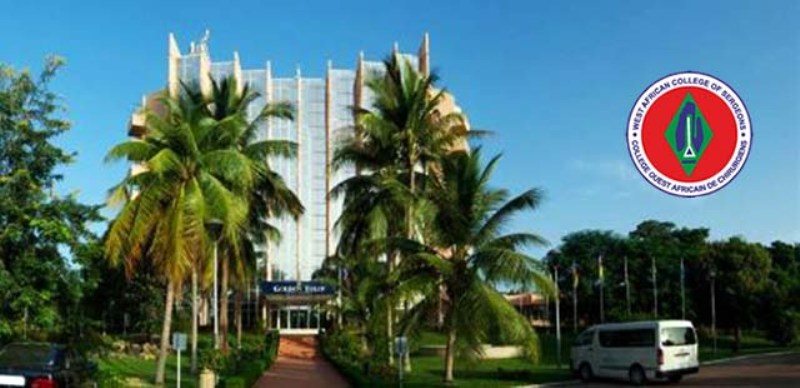The West African College of Surgeons, WACS is a professional organisation that focuses on education, examinations and surgical research in Africa.
WACS became the first college to organise surgical subspecialty training in the West African regions, since its establishment in the early 1960s with the sole aim of tackling challenges and to foster cooperation among the region’s first crop of foreign-trained surgeons.
While the organisation depict West Africa, member countries of WACS are not limited to the West African region. Other countries such as Angola, Cameroun and Congo have been affiliated with the organisation.
The West African College of Surgeons was coined from Association of Surgeons of West Africa (ASWA) 1969 after the later was dissolved in 1973 and its funds and responsibilities shifted to the WACS.
Faculties of the West African College of Surgeons
The college comprises of seven faculties including, Anaesthesia; Dental Surgery; Obstetrics & Gynaecology; Ophthalmology; Otorhinolaryngology; Radiology; Surgery.
As for gaining the award of a fellowship in one of the faculties, it usually takes a period of 4 – 6 years. The examination into the programme is divided into Part I and Part II and candidates must meet certain requirements depending on the choice of faculties/ speciality as written above.
Requirements for Entry into WACS Fellowship Examination
The West African College of Surgeons conducts its fellowship examinations at three levels – Primary, Part 1 and Part 2, in various countries of the West African sub-region in April and October of every year.
The Primary Fellowship Examination is the written exam aimed at detecting candidates with good basic medical sciences and pathophysiology competencies. Passing the primary examination is a pre-requisite for admission into all the various faculties of the college.
The Part 1 and Part 2 Fellowship Examinations assess the cognitive knowledge, skills and best practices of the candidate, in theory, clinical examination, viva voce, and thesis defence. Candidates sitting for the part I and II are trained in accredited tertiary hospitals in West African with the full complement of staff, necessary equipment and following prescribed structured format with log books to ensure that the skills required are acquired before the candidates are approved to sit the examinations.
WACS also provides revision courses which are compulsory for candidates before appearing for each level of the examination.
While the second examination is conducted two years after the first exam when the candidate has chosen a speciality.
- The applicant seeking to sit the Part I Fellowship Examinations is mandated to passed the Primary Examination of the West African College of Surgeons or its equivalent and satisfactorily completed appropriate years of Postgraduate training as prescribed by the relevant Faculty in the institutions accredited for the purpose by the college.
- After successfully passing the Part 1 fellowship examination, every candidate preparing for the Part II is required to attend the compulsory research methodology course and the Medical Manuscript Writing Workshop.
- For candidates applying to sit for part II (final) Fellowship Examinations, it is mandated that the fellow must have passed the Part I Fellowship Examinations of the West African College of Surgeons and satisfactorily completed appropriate years of Postgraduate training and worked in their specialty for at least Two (2) Years in an Institutions(s) accredited for the purpose by WACS as prescribed by the relevant Faculty.
Centres for Examinations of the West African College of Surgeons
WACS centres for examination varies depending on the member countries and the year of examination. Examination centres for 2017 include:
- In NIGERIA- UCH, University College Hospital which is in Ibadan
NCWD, National Centre for Women Development, Abuja;
NOH, National Orthopaedic Hospital which is in Main Hall, Enugu;
UCH, University College Hospital, Ibadan. - In GHANA – KBTH, Korle-Bu Teaching Hospital which is in Accra;
Komfo Anokye Teaching Hospital which is in Kumasi;
KBTH, Korle-Bu Teaching Hospital which is in Accra. - In SIERRA LEONE – Connaught Hospital which is in Freetown in Sierra Leone.
Examination Fee
The examination fee of the West African College of Surgeon is listed as follows:
- Primary Examination – N110,000
- Diploma in Anaesthesia (DA) – N110,000
- Part I Examination – N160,000
- Part II (Final) Examination – N200,000
WACS Pass Rate
In WACS fellowship examination, the average pass rate is said to be below 50% in both Part 1 and Part 2 general surgery examination of the College as opposed to above 70% pass rate in the final general surgery examination in the US.
See Also: Top 10 Greatest Movie Monologues Of All Time
Exemption from Primary Fellowship Examination
According to the WACSCOAC, processing of Exemption from West African College of Surgeons Primary must be completed at least one (1) year before the intended date of sitting the Part I WACS Fellowship Examination. Hence individuals applying for exemption shall take the following steps:
- Application letter addressed to theSecretary-Generall (with contact address, phone number and e-mail address).
- Evidence of having passed Primary Examination from equivalent Colleges (Success Letter).
- Certificate of Full Registration with the Medical & Dental Council of the Resident Country of Applicant.
- Current Annual Practicing Licence Certificate.
- Photocopy of NYSC Discharge Certificate/Certificate of Exemption (For Nigerians).
- Evidence of change of name.
- Photocopy of MBBS Degree Certificate.
- Exemption fee – N150,000 only
- Account Name – West African College of Surgeons.
- Account No – 1014229919 11.
- Name of Bank – UBA, LUTH Branch.
The West African College of Surgeons boasts of numerous international collaborations for training and skills acquisition in Europe and the United States as well as such centres in the West African sub-region – in other to help improve the exposure of candidates to modern skills acquisition.


